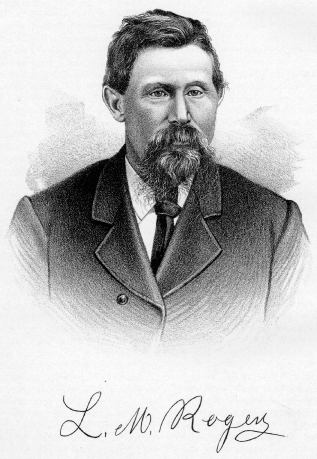to Miss Dulcena Rice, a native of
Kentucky, and the daughter of Michael and Elizabeth
Rice. The latter left the Blue Grass region in 1858,
coming to this county and taking on 160 acres of land
in Clay Precinct. Mr. Burg died Aug. 14, 1863, while
on a freighting expedition to the farther West. He had
served as Justice of the Peace in Clay Precinct, and
with his excellent wife was a member of the Christian
Church. They were the parents of twelve children: Mary
E., Mrs. Rogers; William R., John W.; Julia A., the
wife of Andrew Scott, of this county; Maggie, Mrs.
Robert Inglis, of Clay Precinct; Michael R., Lavina,
Cassandra and Alice, the wife of John Blaine. George
died at the age of eighteen years, Sarah when three
years, and Dora when seven months old.
An admirable portrait of Lewis M.
Rogers is shown on another page, and to his many
friends will be an attractive feature of this
ALBUM.

 OHN
MORLEY, an intelligent, industrious and well-to-do
farmer of Table Rock Precinct, is one of the early
pioneers of Pawnee County, coming here while it was
yet young, ere towns were platted, roads laid out, or
the county seat adopted. He has been an active,
hard-working man, and while laboring for the
improvement of his own property, has not been
unmindful of the needs of the growing precinct where
he located, but has always been identified with all
movements looking toward its advancement. OHN
MORLEY, an intelligent, industrious and well-to-do
farmer of Table Rock Precinct, is one of the early
pioneers of Pawnee County, coming here while it was
yet young, ere towns were platted, roads laid out, or
the county seat adopted. He has been an active,
hard-working man, and while laboring for the
improvement of his own property, has not been
unmindful of the needs of the growing precinct where
he located, but has always been identified with all
movements looking toward its advancement.
Mr. Morley was born Aug. 31, 1816,
in Yorkshire, England, where he was reared and
educated. He engaged in farming when a young man, and
continued thus occupied in his native country until
1851, when he sought new lands and a new home in the
United States. The first five years after coming to
this country our subject lived in Pittston, Pa., where
he was married to Mrs. Ann Bousfield, a native of
England, who had emigrated to the United States when
young. She was subsequently married, and by her first
husband had three children, all of whom lived with our
subject until grown up. Mr. Morley was not quite
satisfied with his future prospects in the Keystone
State, and determined to try farming on Western soil.
Accordingly in the fall of 1856 he started for
Nebraska, coming by rail to St. Louis, thence to
Jefferson City, where he took passage on a river boat
for his intended destination, but on arriving at
Weston the water was so low that the passengers were
obliged to abandon the boat, and buying a yoke of
cattle to draw the baggage, the entire party had to
walk the rest of the way, crossing the river at St.
Stephen's. Our subject pre-empted a tract of land
north of Table Rock, now owned by J. Purcell, which he
partly improved. The following spring he sold out and
bought land lying a little south of where he now
lives. He labored assiduously, and from the wild
prairie eliminated a good farm. It had a fine grove of
forest trees, and he set out an orchard which is now
bearing, and fenced the farm, and placed 175 acres of
it under cultivation. He enlarged the house, put up
good outbuildings, granary and stables. In 1877 Mr.
Morley disposed of that property and bought his
present farm, lying on sections 34 and 35, paying $5
an acre for it. It was then in its normal state, but
with characteristic energy our subject began its
improvement. That he has met with good success in his
labors is shown by the fine condition of his homestead
and its appurtenances. He has erected a commodious
frame house, of neat and tasty architecture,
possessing all the conveniences, of a modern
farmhouse, and also a large barn, 20x70 feet, which is
planed, battened and painted. In 1879 he put up a
windmill which pumps water for use in the house, and
also for the stock. Mr. Morley has besides set out a
line grove of forest trees, a good orchard of fruit
trees, and plenty of small fruits and shrubbery,
rendering his estate one of the most beautiful in the
locality. He has taken much interest in stock-raising,
and been largely instrumental in bringing up the
standard of the stock in his community. He was the
first to bring a thoroughbred Short-horn into the
vicinity, he having bought it for $100 when it was a
calf, of Mr. Daniels, of Sarpy County. Two years later
Mr. Blacklaw brought some Short-horns into the
precinct, and our subject subsequently purchased other
full-blooded cows and bulls, registered Short-horns,
and made a specialty of stock-raising. For his
endeav-
|


